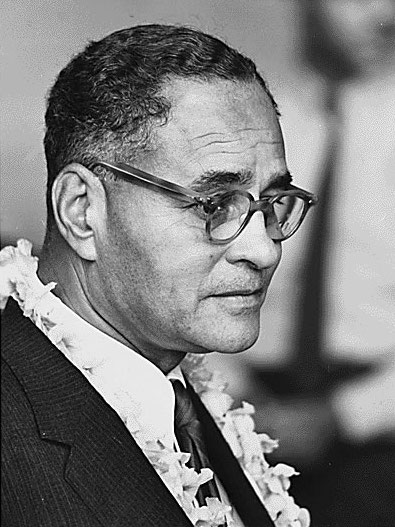in Indonesia, Palestine, and Kashmir - has demonstrated convincingly that parties to the most severe conflict may be induced to abandon war as the method of settlement in favour of mediation and conciliation, at a merciful saving of untold lives and acute suffering. Unfortunately, there may yet be some in the world who have not learned that today war can settle nothing, that aggressive force can never be enough, nor will it be tolerated. If this should be so, the pitiless wrath of the organized world must fall upon those who would endanger the peace for selfish ends. For in this advanced day, there is no excuse, no justification, for nations resorting to force except to repel armed attack.
Some Reflections on Peace in Our Time (1950)
Ralph Bunche: Frasi in inglese
Some Reflections on Peace in Our Time (1950)
Contesto: There can be peace and a better life for all men. Given adequate authority and support, the United Nations can ensure this. But the decision really rests with the peoples of the world. The United Nations belongs to the people, but it is not yet as close to them, as much a part of their conscious interest, as it must come to be. The United Nations must always be on the people's side. Where their fundamental rights and interests are involved, it must never act from mere expediency. At times, perhaps, it has done so, but never to its own advantage nor to that of the sacred causes of peace and freedom. If the peoples of the world are strong in their resolve and if they speak through the United Nations, they need never be confronted with the tragic alternatives of war or dishonourable appeasement, death, or enslavement.
Some Reflections on Peace in Our Time (1950)
Contesto: There can be peace and a better life for all men. Given adequate authority and support, the United Nations can ensure this. But the decision really rests with the peoples of the world. The United Nations belongs to the people, but it is not yet as close to them, as much a part of their conscious interest, as it must come to be. The United Nations must always be on the people's side. Where their fundamental rights and interests are involved, it must never act from mere expediency. At times, perhaps, it has done so, but never to its own advantage nor to that of the sacred causes of peace and freedom. If the peoples of the world are strong in their resolve and if they speak through the United Nations, they need never be confronted with the tragic alternatives of war or dishonourable appeasement, death, or enslavement.
Some Reflections on Peace in Our Time (1950)
Contesto: In the final analysis, the acid test of a genuine will to peace is the willingness of disputing parties to expose their differences to the peaceful processes of the United Nations and to the bar of international public opinion which the United Nations reflects. It is only in this way that truth, reason, and justice may come to prevail over the shrill and blatant voice of propaganda; that a wholesome international morality can be cultivated.
Some Reflections on Peace in Our Time (1950)
Some Reflections on Peace in Our Time (1950)
Contesto: A favourable climate for peaceful negotiation must be created and can only be created by painstaking, unremitting effort. Conflicting parties must be led to realize that the road to peace can never be traversed by threatening to fight at every bend, by merely being armed to the teeth, or by flushing every bush to find an enemy. An essential first step in a civilized approach to peace in these times would call for a moratorium on recrimination and reproach.
Some Reflections on Peace in Our Time (1950)
Some Reflections on Peace in Our Time (1950)
Some Reflections on Peace in Our Time (1950)
Some Reflections on Peace in Our Time (1950)
Some Reflections on Peace in Our Time (1950)
Some Reflections on Peace in Our Time (1950)
Some Reflections on Peace in Our Time (1950)
